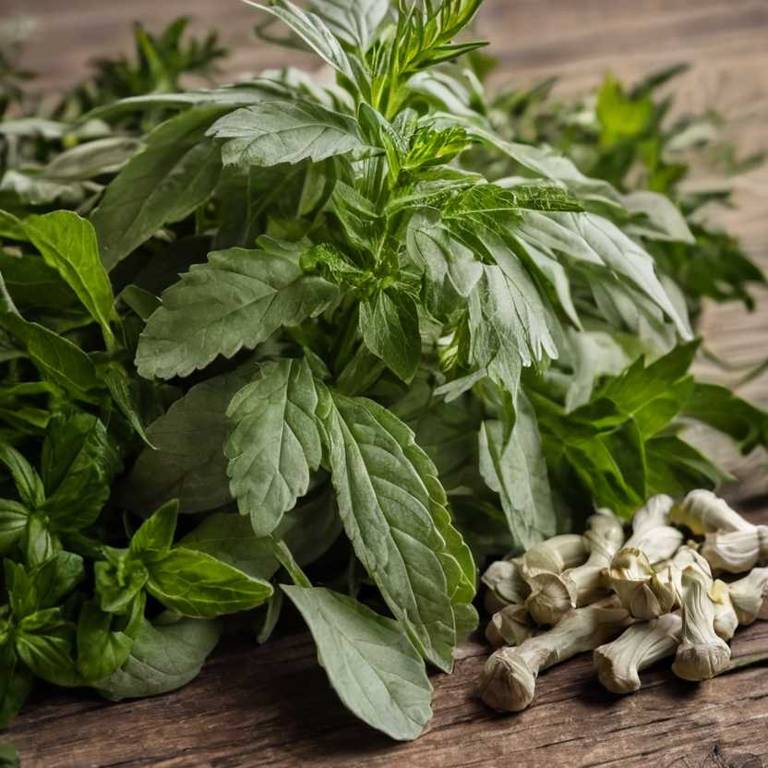By Leen Randell
Updated: Jul 20, 2024
10 Medicinal Constituents Of Turnera Diffusa (Damiana)

Turnera diffusa has active constituents such as flavonoids, alkaloids, and phenolic acids, which contribute to its medicinal properties.
These constituents possess anti-inflammatory and antioxidant activities, which can help alleviate symptoms of stress, anxiety, and insomnia. By reducing stress and promoting relaxation, damiana's constituents can improve the quality of life for individuals experiencing mood disorders.
Additionally, its anti-inflammatory properties can provide relief from menstrual cramps and other gynecological issues.
This article explains in details the 10 best active constituents of Turnera diffusa.
1. Luteolin
Turnera diffusa luteolin is a flavonoid compound that has been found to have numerous health benefits.
It is extracted from the leaves of the Turnera diffusa plant, which is native to Central and South America. Luteolin has been shown to possess antioxidant, anti-inflammatory, and antimicrobial properties, making it effective in treating various health conditions such as anxiety, depression, and respiratory issues.
Additionally, it may also have potential benefits for cardiovascular health.
2. Apigenin
Turnera diffusa apigenin is a flavonoid compound extracted from its leaves.
Apigenin has been identified for its potential health benefits, including anti-inflammatory and antioxidant properties. Studies have shown that it may help to alleviate symptoms of anxiety and stress, as well as improve cardiovascular health by reducing blood pressure and cholesterol levels.
Additionally, apigenin has been found to possess antimicrobial and antifungal activities, making it a promising compound for various therapeutic applications.
3. Kaempferol
Turnera diffusa kaempferol is a flavonoid compound that has been isolated from the plant.
It has been shown to possess various biological activities, including antioxidant, anti-inflammatory, and antimicrobial properties. Kaempferol has also been reported to have potential therapeutic effects on cardiovascular diseases, cancer, and neurodegenerative disorders.
Its bioactive properties make it a promising natural compound for the development of novel medicines and health supplements.
4. Quercetin
Turnera diffusa quercetin is a flavonoid compound extracted from its leaves.
This natural antioxidant has been traditionally used in herbal medicine to treat various health issues, including digestive problems, insomnia, and stress. Quercetin has anti-inflammatory and antibacterial properties, making it effective against infections and allergies.
It also exhibits antiviral activity, which can help combat viral diseases such as colds and flu.
5. Isorhapontigenin
Turnera diffusa isorhapontigenin is a flavonoid compound that has been isolated from the leaves of this plant.
It has been reported to possess various pharmacological activities, including antioxidant, anti-inflammatory, and antimicrobial properties. Isorhapontigenin has also been found to have potential therapeutic effects on cardiovascular diseases, diabetes, and certain types of cancer.
Its mechanism of action involves modulating various signaling pathways and regulating gene expression.
6. Rhamnetin
Turnera diffusa rhamnetin is a flavonoid compound isolated from the leaves of the plant.
It has been traditionally used in Mexican folk medicine to treat various health conditions, including digestive issues and sexual dysfunction. Rhamnetin has been found to exhibit antioxidant, anti-inflammatory, and antimicrobial properties, making it a potential natural remedy for various diseases.
Further research is needed to fully understand its therapeutic potential.
7. Isoliquiritigenin
Turnera diffusa isoliquiritigenin is a flavonoid compound extracted from its leaves.
It has been traditionally used in herbal medicine to treat various health issues, including anxiety, depression, and erectile dysfunction. Studies have shown that isoliquiritigenin possesses anti-inflammatory, antioxidant, and vasodilatory properties, which may contribute to its potential therapeutic effects.
Its mechanisms of action are not fully understood, but it is believed to interact with neurotransmitters and hormones to produce its beneficial effects.
8. Beta-sitosterol
Turnera diffusa beta-sitosterol is a type of phytochemical compound found in this plant species.
It has been traditionally used to treat various health issues such as anxiety, depression, and sexual dysfunction. Beta-sitosterol has been shown to have anti-inflammatory properties, which may contribute to its therapeutic effects.
Additionally, it has been demonstrated to have antioxidant and antimicrobial activities, further supporting the potential benefits of Turnera diffusa extract for overall health.
9. Ursolic acid
Turnera diffusa ursolic acid is a naturally occurring compound found in the leaves of this plant.
It has been extensively studied for its potential health benefits, including anti-inflammatory and antioxidant properties. Ursolic acid has been shown to inhibit the growth of cancer cells, reduce inflammation, and improve cardiovascular health.
Additionally, it may also have antibacterial and antiviral effects, making it a promising compound for further research in the field of natural medicine.
10. Oleanolic acid
Turnera diffusa oleanolic acid is a bioactive compound isolated from the plant.
It has been shown to possess various pharmacological properties, including antioxidant, anti-inflammatory, and antimicrobial activities. Oleanolic acid has been demonstrated to exhibit significant cytotoxic effects against several types of cancer cells, making it a potential agent for cancer treatment.
Its ability to inhibit cell proliferation and induce apoptosis makes it an attractive compound for further research in the field of oncology.